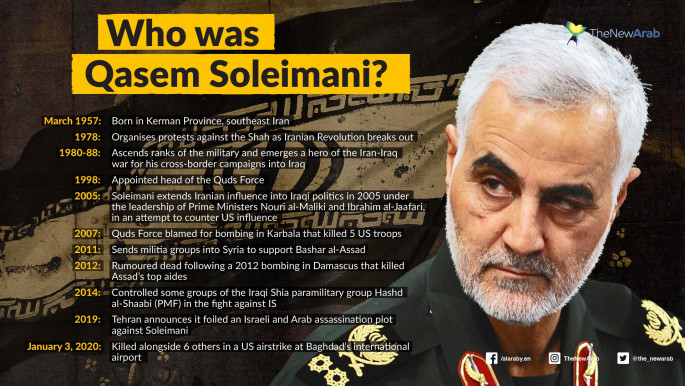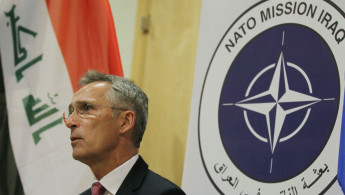NATO suspends training missions in Iraq after Soleimani killing
The NATO mission in Iraq, which numbers in the hundreds, trains the country's security forces at the request of the Baghdad government to prevent the return of the Islamic State group.
"NATO's mission is continuing, but training activities are currently suspended," said the spokesman, Dylan White.
He also confirmed that NATO Secretary General Jens Stoltenberg had spoken by telephone with US Secretary of Defence Mark Esper "following recent developments."
The halt in operations followed a similar decision by the US-led coalition in Iraq which announced a suspension to the training of Iraqi forces on Friday, according to a German military letter.
US Lieutenant General Pat White's decision aimed to provide an extra level of protection for American troops in the country amid widespread fear of an Iranian retaliation to the killing of Qasem Soleimani, a senior German officer said in the letter to lawmakers in Berlin.
"Thus, the training for the Iraqi security and armed forces throughout Iraq is temporarily suspended," German Lieutenant General Erich Pfeffer wrote to members of the Bundestag defence and foreign relations committees in the letter, Reuters reported.
"The directive is binding for all partner nations involved in OIR at the training sites in Iraq," he added, referring to forces deployed in Iraq under Operation Inherent Resolve (OIR), which he commands.
Around 120 German troops are involved in the US-led OIR operation in Iraq.
Early on Saturday, German Greens politician Omid Nouripour said German soldiers should be immediately extracted from Iraq due to a lack of security guarantees.
"The risk of an escalation is very high," he said, warning that Iran's armed forces could "hit the Americans and us, as their allies, massively".
Nouripour also suggested in an interview with DW the need to revive "any imaginable mechanism of crisis diplomacy", including sending Germany's foreign minister to Tehran, Riyadh, Doha and Ankara "to prevent an overreaction to a potential Iranian overreaction".
The suspension of the US-led coalition and NATO as well as the US' recent targeting of Hashd al-Shaabi forces - all of which played pivotal roles to crush the Islamic State group in the regio - could give space for the militant group's sleeper cells to mobilise.
The latest developments came after the US announced it would deploy 3,000 additional troops to Iraq as a "precautionary" measure after the killing of the Iranian general, which Tehran has slammed as tantamount to starting a war.
Early on Friday, a volley of missiles hit Baghdad's international airport, striking a convoy belonging to the Hashd al-Shaabi, an Iraqi paramilitary force with close ties to Iran.
Just a few hours later, Iran's Revolutionary Guard Corps announced Soleimani "was martyred in an attack by America on Baghdad airport this morning".
The Hashd confirmed both Soleimani and its deputy chief Abu Mahdi al-Muhandis were killed in what it said was a "US strike that targeted their car on the Baghdad International Airport road".
Read more: Who was Qassem Soleimani, the powerful commander of Iran's elite Quds force?
The Pentagon said US President Donald Trump had ordered Soleimani's "killing" after a pro-Iran mob this week laid siege to the US embassy in the Iraqi capital.
The Iraqi prime minister said the strike was a "flagrant violation" of a security accord with the US, warning it would "spark a devastating war in Iraq".
A paramilitary group, Asaib Ahl al-Haq, urged its fighters to be on high alert, while in Lebanon, the leader of Iran-backed Hezbollah, Hassan Nasrallah, warned of "punishment for these criminal assassins".
The developments come after an unprecedented attack on the US mission in Baghdad.
A mob of Hashd al-Shaabi supporters surrounded the US embassy on Tuesday, angered by American airstrikes that killed 25 fighters from the network's hardline Kataeb Hezbollah faction, which is backed by Iran.
The US had acted in response to a rocket attack days earlier that had killed an American contractor working in Iraq.
Iran has declared it will seek to avenge the killing of Soleimani, widely considered among the most powerful figures in the Islamic Republic, second only to the supreme leader Ayatollah Khamenei.
"President Trump just tossed a stick of dynamite into a tinderbox," former vice president Joe Biden said in a statement.
"Iran will surely respond. We could be on the brink of a major conflict across the Middle East."
Meanwhile, the UN is on the brink of re-issuing sanctions on Iran, as Tehran pushes ahead with uranium enrichment, in breach of the limits on its nuclear programme imposed by the 2015 nuclear deal.
President Trump unilaterally withdrew from the deal brokered by his predecessor Barack Obama, reimposing harsh sanctions on Iran and sparking renewed tensions which have mounted until now.
 |





 Follow the Middle East's top stories in English at The New Arab on Google News
Follow the Middle East's top stories in English at The New Arab on Google News


